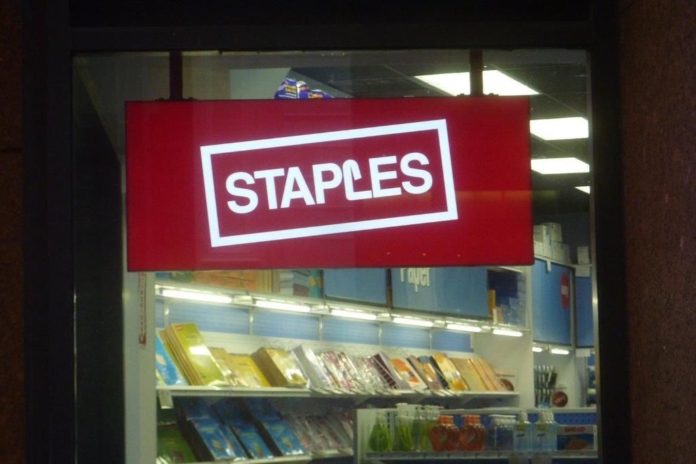The U.S. lawsuit to block Staples Inc. from buying Office Depot Inc. now rests with a judge who has undercut the government’s case throughout the trial.
During final arguments Tuesday by the companies and the Federal Trade Commission, District Judge Emmet Sullivan needled the government about why its economic expert completed his analysis about the scope of the market only after the agency filed its complaint. It would have been more logical if the expert had come to his conclusions earlier, the judge said.
“I’m still kind of troubled by that,” he said.
Sullivan’s query was the latest in a string of pointed questions for the FTC during the nearly three-week trial. He challenged how the agency prepared a witness statement, whether it shared certain information with the companies and why it didn’t allege harm to consumers who buy pens and Post-its. In fact, the FTC said the merger would harm competition in sales to corporate customers – not retail consumers – in its suit to block the $6.3 billion proposed merger.
FTC lawyer Tara Reinhart pointed to bidding data that shows Staples and Office Depot are the only two companies winning business from large companies.
“Customers tangibly benefit from the head-to-head competition,” she said.
Sullivan, a long-serving judge who has been a vocal critic of government lawyers, has repeatedly pressed the two sides to reach their own settlement after the suit was filed in December. The FTC told him the remedies proposed by the companies weren’t enough. In response, the judge suggested an unorthodox resolution: Why not give the merger a trial run to see whether the government’s warnings about higher prices would happen? That would make it all the more difficult to unwind the merger, the FTC said.
Though the judge could still block the tie-up, investors think otherwise. Since the trial began in March, the spread has narrowed between Staples’s offer price and Office Depot’s share price.
“Sullivan’s direct questioning of witnesses and criticism of the FTC during the hearing gave investors the impression that the FTC’s case was being undermined,” said Ira Gorsky, an analyst at Elevation who has been following the trial. “That made them put higher odds on Staples prevailing in court.”
Sullivan has been hard on the government since the start of the proceeding, which gives both sides the opportunity to present evidence on the tie-up so that the judge can decide whether to allow the companies to merge or issue an order to halt the deal pending an FTC administrative trial.
“The antitrust laws shouldn’t be enforced like this where you sue to block a merger that’s squarely in the public interest” because the companies will be more efficient and pass savings on to consumers, said Diane Sullivan, a lawyer for Staples who isn’t related to the judge.
Three days into the hearing last month, the judge accused the FTC of trying to elicit false information from an executive of Amazon.com Inc. about the retailer’s ability to compete against Staples and Office Depot.
As the executive, Prentis Wilson, was testifying, Sullivan interrupted and took over the questioning. Wilson said he was reluctant to say that Amazon wouldn’t be ready to service the corporate office supply market for two years – as the FTC had suggested – because the company might be ready sooner.
“Were you surprised that the government was telling you what to say and not say?” Sullivan asked Wilson.
“Yes,” Wilson said.
The judge’s challenge undercut one of the central tenets of the FTC’s case – that the tie-up would be anticompetitive in part because Amazon wasn’t significant enough to win business from large companies.
“Harping on the Amazon issues and giving the impression there was some level impropriety really shocked investors,” Elevation’s Gorsky said.
Sullivan dealt another blow to the FTC when he said a government expert couldn’t testify about his projections of future competition from Amazon because the agency didn’t share the expert’s analysis with Staples and Office Depot ahead of time. That was “fundamentally unfair,” Sullivan said.
Sullivan, who was appointed to the federal bench in 1994 by President Bill Clinton, has clashed with government lawyers before. He oversaw the 2008 corruption trial of then-Sen. Ted Stevens of Alaska, a case that collapsed after the Justice Department discovered that prosecutors had withheld evidence that would have helped Stevens contest the charges against him. Sullivan ultimately set aside Stevens’s conviction in 2009 and ordered an investigation into prosecutors’s conduct.
Presiding over the Justice Department’s lawsuit to block Electrolux’s purchase of General Electric’s appliance business, he set down rules that he said would make the proceeding fair and transparent.
Sullivan forced the government’s lawyers to share evidence with the companies related to witness testimony in the Electrolux trial, even though they said that over dozens of trials the government hadn’t been required to share exhibits.
“I don’t care what your colleagues said about it,” he told a Justice Department lawyer about the order to share information. “It’s not going to be a trial by surprise.”
More recently in the Staples case, Sullivan asked questions about a fundamental principle of merger law, namely that the government is supposed to guard against harm to competition, even when companies are the ones affected by higher prices.
Sullivan pressed FTC lawyers about why they didn’t allege harm to retail consumers who buy pens and notebooks in stores. He recalled that when the Justice Department sued to stop the Electrolux-GE tie-up, government lawyers raised the example of a fictitious “Mrs. Smith” who might face hardship paying $100 more for an oven as a result of reduced competition.
“I’ve not heard any references to the average consumer,” Sullivan said. Reinhart, the FTC lawyer, explained that the case isn’t focused on individual consumers, but on whether corporations that sign big office-supply contracts would be harmed by less competition.
“That seems odd,” he said.
“No, your honor, it’s not odd at all,” Reinhart said. “This is $2 billion a year in commerce. It’s significant.”






